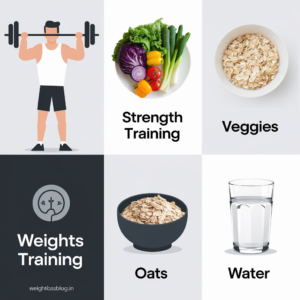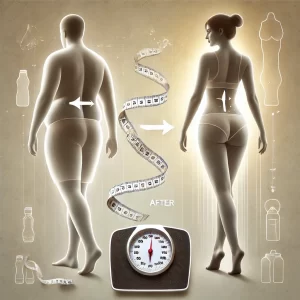How to Lose Weight with the HCG Diet: A Step-by-Step Guide for Beginners
Introduction to the HCG Diet
The HCG Diet is a controversial weight loss plan that involves taking human chorionic gonadotropin (HCG) hormone supplements, typically through injections or drops, while following a very low-calorie diet (VLCD). HCG is a hormone that is naturally produced during pregnancy, and proponents of the diet claim that it helps  promote rapid fat loss by boosting metabolism and suppressing hunger.
promote rapid fat loss by boosting metabolism and suppressing hunger.
The HCG Diet gained popularity in the 1950s when Dr. A.T.W. Simeons developed the diet, combining HCG injections with a 500-calorie per day meal plan. Despite its effectiveness for rapid weight loss, the diet has been met with skepticism and criticism from health professionals due to its extreme calorie restriction and reliance on hormone supplements. In this guide, we’ll explore how the HCG Diet works, its benefits, and how to follow a HCG diet meal plan for weight loss.
How the HCG Diet Works for Weight Loss
The HCG Diet works for weight loss by combining the effects of HCG hormone supplements with a very low-calorie diet (VLCD). The diet typically consists of two main components:
- HCG Hormone: HCG hormone is administered through injections, drops, or pellets. It is believed to help the body break down stored fat for energy, suppress appetite, and improve metabolism, making it easier to adhere to the low-calorie diet without feeling excessively hungry.
- Very Low-Calorie Diet (VLCD): The second component of the HCG Diet is a strict 500-calorie per day meal plan. This diet plan focuses on lean proteins, non-starchy vegetables, and minimal carbohydrates, with limited fats and sugars.
The combination of HCG hormone supplements and the extremely low-calorie intake is thought to help the body access fat stores for energy, leading to rapid fat loss. However, it’s important to note that the effectiveness of the HCG hormone in promoting weight loss has been debated, and some experts suggest that the weight loss experienced on the diet is primarily due to the extreme calorie restriction rather than the hormone itself.
Phases of the HCG Diet
The HCG Diet is divided into several phases:
- Phase 1: Loading Phase – During this phase, individuals consume high-calorie, high-fat foods for two days while beginning the HCG hormone supplements. The goal is to prepare the body for the low-calorie phase by “loading” up on fat stores.
- Phase 2: Low-Calorie Phase – In this phase, participants follow the 500-calorie per day diet while continuing the HCG hormone supplements. This phase typically lasts for 3-6 weeks, depending on the weight loss goals.
- Phase 3: Maintenance Phase – After completing the low-calorie phase, individuals stop taking the HCG supplements and gradually increase
 their calorie intake while avoiding starches and sugars for several weeks.
their calorie intake while avoiding starches and sugars for several weeks. - Phase 4: Long-Term Maintenance – In the final phase, participants transition to a balanced diet and focus on maintaining their weight loss by making healthy food choices and practicing portion control.
Benefits of the HCG Diet for Weight Loss and Health
The HCG Diet offers several benefits for those looking to lose weight quickly. Here are some of the key advantages:
1. Rapid Weight Loss
One of the primary benefits of the HCG Diet is the potential for rapid weight loss. Because the diet involves extreme calorie restriction and the use of HCG hormone supplements, many people report losing significant amounts of weight in a short period. Some individuals claim to lose up to 1-2 pounds per day while following the HCG Diet.
2. Reduced Hunger and Cravings
The HCG hormone is believed to help reduce hunger and cravings, making it easier to adhere to the 500-calorie diet. Many people on the HCG Diet report feeling less hungry than they would expect, given the low-calorie intake, which helps prevent overeating or giving in to cravings.
3. Targeted Fat Loss
Proponents of the HCG Diet claim that the hormone helps the body target fat stores, particularly in areas like the abdomen, hips, and thighs. By breaking down stored fat for energy, the diet is said to promote fat loss while preserving lean muscle mass. However, more research is needed to confirm whether HCG specifically targets fat in this way.
4. Structured Plan
The HCG Diet provides a structured plan that includes clear guidelines for what to eat, when to take supplements, and how to transition to a maintenance phase. This structure can be helpful for individuals who prefer  a clear, step-by-step approach to dieting.
a clear, step-by-step approach to dieting.
Potential Drawbacks of the HCG Diet
While the HCG Diet offers rapid weight loss, it also comes with several potential drawbacks and risks. It’s important to consider these before starting the diet:
1. Extreme Calorie Restriction
One of the main concerns with the HCG Diet is the extreme calorie restriction, which may lead to nutrient deficiencies and other health issues. Consuming only 500 calories per day can be difficult to maintain and may result in fatigue, dizziness, irritability, and a weakened immune system. It’s important to consult a healthcare provider before starting the diet to ensure it’s safe for your individual needs.
2. Lack of Scientific Evidence
Despite its popularity, there is limited scientific evidence to support the effectiveness of HCG hormone supplements for weight loss. Many experts argue that the rapid weight loss experienced on the diet is primarily due to the calorie restriction rather than the hormone itself. Additionally, the U.S. Food and Drug Administration (FDA) has not approved HCG for weight loss and has issued warnings against using over-the-counter HCG products.
3. Difficulty Maintaining Weight Loss
While the HCG Diet may result in rapid weight loss, maintaining the weight loss long-term can be challenging. The extreme nature of the diet makes it difficult to follow for an extended period, and many people struggle to keep the weight off once they return to a more normal eating pattern. The maintenance phase of the diet is crucial for preventing weight regain, but it can be difficult to sustain.
4. Potential Side Effects
Some people may experience side effects while following the HCG Diet, including headaches, irritability, fatigue, and mood swings. These side effects are often related to the extremely low-calorie intake and can make the diet difficult to adhere to. Additionally, there are concerns about the safety of HCG hormone supplements, particularly when purchased from unregulated sources.
Tips for Success on the HCG Diet
To maximize your success on the HCG Diet and achieve your weight loss goals, follow these practical tips:
1. Work with a Healthcare Provider
Because the HCG Diet involves hormone supplements and extreme calorie restriction, it’s important to consult with a healthcare provider before starting the diet. They can help monitor your progress, ensure you’re getting the necessary nutrients, and address any potential side effects or concerns.
2. Plan Your Meals Carefully
The HCG Diet requires strict adherence to a 500-calorie per day meal plan, so it’s important to plan your meals carefully to ensure you’re getting enough nutrients. Focus on lean proteins, non-starchy vegetables, and limited fruits, and avoid foods high in fats, sugars, and starches. Meal planning in advance can help you stick to the diet and avoid temptation.
3. Stay Hydrated
Drinking enough water is essential for overall health, especially when following a very low-calorie diet. Staying hydrated can help reduce hunger, support digestion, and prevent fatigue. Aim to drink at least 8 glasses of water per day while on the HCG Diet.
4. Follow the Maintenance Phase
The maintenance phase of the HCG Diet is crucial for preventing weight regain. After completing the low-calorie phase, gradually increase your calorie intake and avoid starches and sugars for several weeks. This will help your body adjust to a more normal eating pattern without regaining the weight you’ve lost.
5. Be Prepared for Challenges
The HCG Diet can be challenging due to its extreme restrictions, so it’s important to be mentally prepared for potential difficulties. You may experience hunger, fatigue, or irritability during the low-calorie phase, but staying committed to the diet and focusing on your goals can help you push through these challenges.
Scientific Evidence and Case Studies
While the HCG Diet has been popular for decades, the scientific evidence supporting the use of HCG hormone supplements for weight loss is limited. A review of studies published in the journal Nutrition and Metabolism concluded that there is no convincing evidence that HCG has any effect on fat mobilization, appetite suppression, or the distribution of fat in the body.
However, some case studies have shown that individuals who follow the HCG Diet can experience significant weight loss, primarily due to the extreme calorie restriction. These results suggest that the rapid weight loss is likely due to the VLCD rather than the hormone itself.
Who Should Try the HCG Diet?
The HCG Diet may be suitable for individuals who:
- Are looking for a structured, short-term diet plan that can result in rapid weight loss.
- Prefer a clear set of guidelines for meals, supplements, and maintenance.
- Are willing to commit to extreme calorie restriction for a limited period to achieve their weight loss goals.
- Have consulted with a healthcare provider and received approval to follow the diet.
Who Should Avoid the HCG Diet?
While the HCG Diet may work for some people, it’s not suitable for everyone. You should avoid the HCG Diet if you:
- Have a history of disordered eating or are prone to unhealthy dieting behaviors.
- Have certain medical conditions, such as diabetes, heart disease, or metabolic disorders, that could be worsened by extreme calorie restriction.
- Are concerned about the safety or efficacy of HCG hormone supplements.
- Prefer a more balanced, sustainable approach to weight loss.
Conclusion
The HCG Diet is a highly restrictive weight loss plan that combines hormone supplements with a very low-calorie meal plan to promote rapid fat loss. While some people report significant weight loss on the diet, it’s important to be aware of the potential risks, including nutrient deficiencies, difficulty maintaining weight loss, and the lack of scientific evidence supporting the use of HCG for weight loss. If you’re considering the HCG Diet, consult with a healthcare provider to ensure it’s the right choice for your health and weight loss goals.